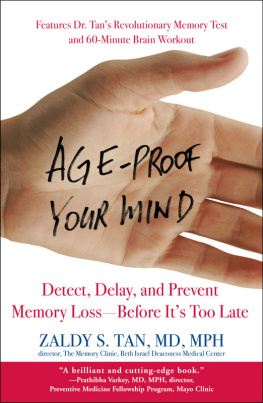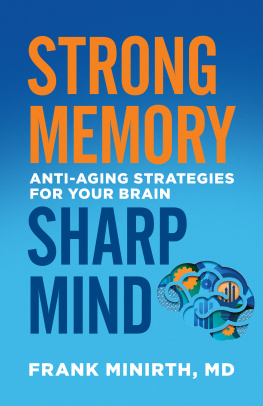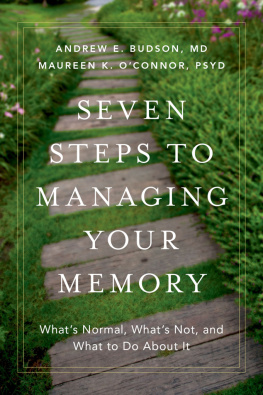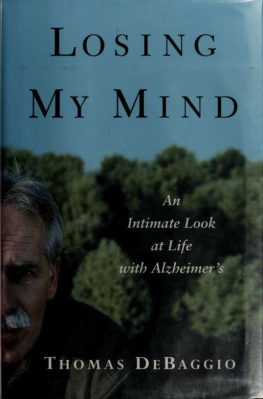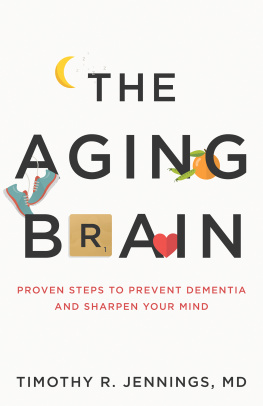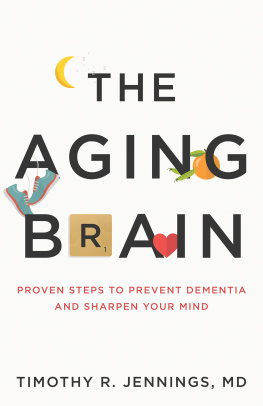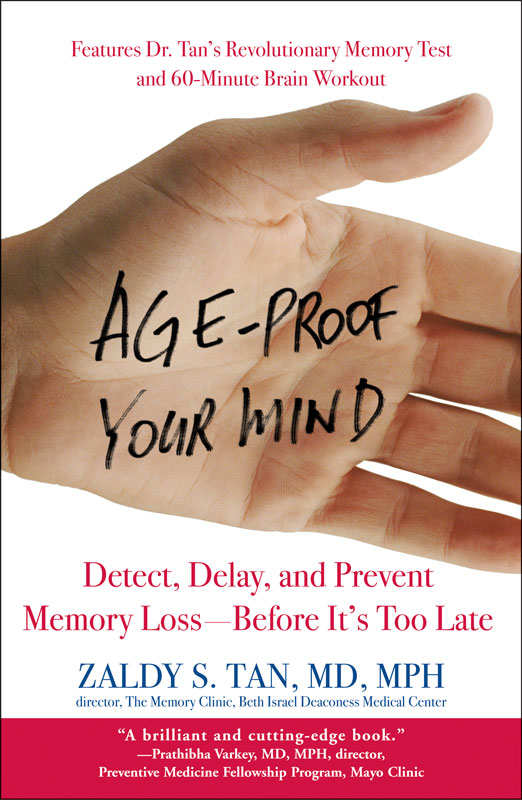Introduction
Epigraph
Chapter 1
Chapter 2
Chapter 3
Chapter 4
Chapter 5
Chapter 6
Chapter 7
Chapter 8
Chapter 9
Chapter 10
Chapter 11
Chapter 12
Chapter 13
Chapter 14
Appendix 1
Copyright 2005 by Zaldy Sy Tan, MD
All rights reserved.
Warner Books
Hachette Book Group, USA
237 Park Avenue, New York, NY 10017
Visit our Web site at www.HachetteBookGroupUSA.com.
First eBook Edition: March 2005
ISBN: 978-0-446-53380-5
To Rudy and Julita
An endeavor such as this would not have been possible if not for the support of countless people who have helped me along the way. I especially want to acknowledge the contributions of Dr. George Rebok of the Johns Hopkins University, who put his many years of research experience to work in helping develop the innovative memory improvement and workout programs presented in this book. I thank my agent, Stedman Mays of Scribblers House LLC, for his encouragement and advice. His colleague Mary Tahan was also helpful in the early stages of this project. Thanks also to Dr. Bradley Willcox of the Okinawa Centenarian Study for pointing me to the right direction. My editor at Warner Books, Diana Baroni, gave me positive feedback that helped shape this project into a better book. Sayaka Mitsuhashi contributed her knowledge of nutrition and her skills in recipe writing to this book. I extend my gratitude to Susanne Klingenstein of the Harvard-MIT Division of Health Sciences and Technology, to my classmates at HST 960, and to my mentors and colleagues at the HMS Division on Aging, the Beth Israel Deaconess Medical Center, the Hebrew Rehabilitation Center, and the Framingham Heart Study for their insightful comments and suggestions. I thank my students, whose intellectual curiosity and idealism serve as a constant source of inspiration to educators like me. I thank my family, Rudy & Julita, Jerry & Jackie, Kenneth & Debbie, Addison & Susan, Teddy & Veronica, my nieces and nephews for their love, patience, and understanding. Finally, I acknowledge the assistance and inspiration from all my patients, past, present, and future, and their familieswho are the real unsung heroes to whom I tip my hat.
Dr. Alan Zarkin squinted, closely inspecting the result of his handiwork. Under the bright operating room light, his patients iodine-coated skin glistened. The sutures that approximated the bikini skin incision he had made to deliver Lianas healthy baby were perfectly symmetric: Each one was equally as far from the one that preceded it as from the one that followed it; the ends were cut exactly half a centimeter from the skin surface.
I did such a beautiful job, Ill initial it, proclaimed Dr. Zarkin.
In one swift move, he picked up the scalpel from the tray and proceeded to carve a three-inch-tall letter A followed by a Z on Lianas skin, as any artist would his masterpiece. The surgical team who witnessed the inexplicable mutilation in the operating room gave a collective gasp. And when the news broke out on the front page of major newspapers, that gasp was repeated by the rest of the world. Unbeknownst to his patient, the veteran obstetrician had already been the subject of several complaints about erratic behavior. In fact, Dr. Zarkin had been suspended five months earlier by the prestigious Manhattan hospital where he practiced. The doctors list of bizarre behaviors allegedly included screaming at co-workers and pulling and yanking a newborn infants arm and legs after delivery. In the legal onslaught that followed the infamous incident, Dr. Zarkins lawyer revealed that his client had been suffering from a serious degenerative brain condition similar to Alzheimers disease. Nobody knows for sure whether the doctor had had ominous signs of a memory problem before he exhibited this bizarre behavior and whether he and the people around him simply chose to ignore it. However, because the typical course of a degenerative brain disease is best characterized as slow and smoldering over many years, red flags of a failing mind probably existed long before this regrettable event. Whenever I recall this case, I cant help but wonder: How many Dr. Zarkins are living among us?
Most people are blissfully unaware of their own chances of getting Alzheimers disease, much less if they already have the earliest stages of it. While they know their last cholesterol level and blood pressure, they are oblivious to the status of their memory and cognitive abilities. The thought of having progressive memory loss provokes feelings of fear and denial in many of us. Thus, early warning signs are often too easily dismissed by rationalization and swept under the rug of borrowed time. In the back of the minds of millions of aging Americans is a lingering question. When they misplace their keys or find that they have to circle the lot for fifteen minutes to locate their parked car, they secretly worry. When the health reporter on the nightly news announces cutting-edge research that claims to be able to detect early Alzheimers disease, they turn up the volume. And as they watch the quick-witted man or woman of their childhood fade away before their eyes, they wonder if they and their children are destined to suffer the same fate, and how long they have before it gets them.
Each year in the United States, an estimated 360,000 new cases of Alzheimers are diagnosed. With the average life expectancy increasing, the number of Americans with Alzheimers disease is expected to triple in the next forty years. And as many of us look forward to living to a hundred, we must also face the fact that one out of two people over the age of eighty-five has Alzheimers. Scientists used to call occasional lapses of memory benign forgetfulness, which they considered to be part and parcel of normal aging. Now it is known that subtle memory lapses may be heralding the appearance of Alzheimers disease a few years down the road. A specific set of criteria defines this very early dementia, known in scientific circles as mild cognitive impairment or MCI. Without treatment, up to half of people with MCI will progress to Alzheimers disease in just three to four years. More than ever, it is important to identify individuals who have MCIthey are the ones most likely to benefit from interventions that can delay or even prevent the progression of irreversible memory loss.
In this book, I will present the latest scientific research on the prevention, early detection, and treatment of memory loss. The first part of the book will explore the beneficial and adverse factors that influence the development of the human mind by promoting its preservation or threatening to undermine its future. These include novel scientific concepts such as brain plasticity and mild cognitive impairment (MCI), two of the most promising areas of memory and brain aging research. In part 2, I will interpret and summarize the latest breakthrough discoveries on the role of diet, physical and mental exercise, estrogen replacement therapy, and antioxidant and anti-inflammatory medications in delaying or preventing age-related memory decline and Alzheimers disease. In part 3, I will help you identify your own risk for Alzheimers disease and provide you with a way to assess the present status of your mind. The Memory Stress Test, a comprehensive set of tests designed to help you identify your minds unique set of strengths and weaknesses, also has the potential of identifying early signs of memory loss when taken regularly. I will also propose a ten-step multimodal approach to age-proofing your mind that includes powerful memory improvement techniques and a Sixty-Minute Brain Workout especially developed for this book to sharpen your mental abilities.

